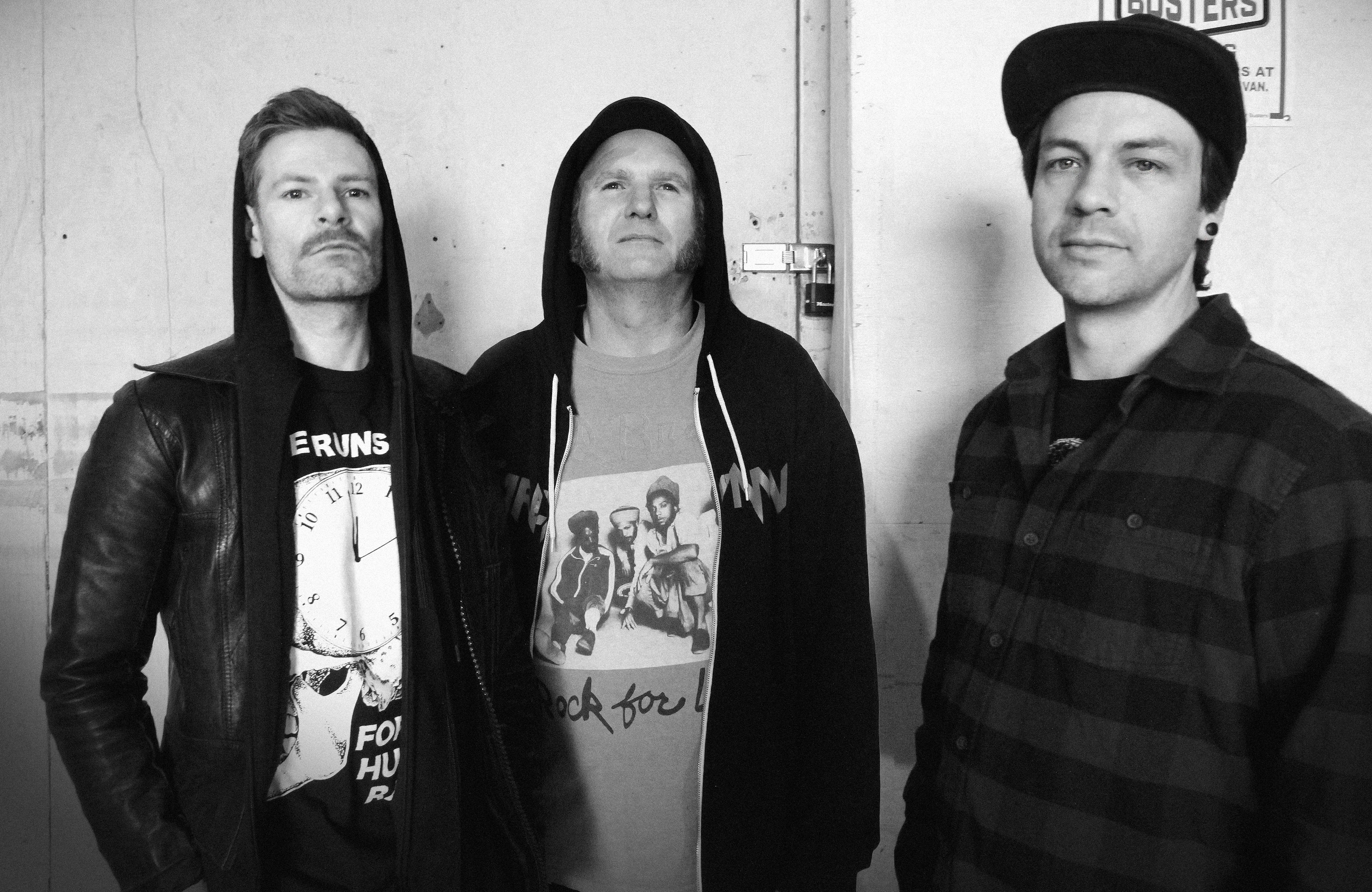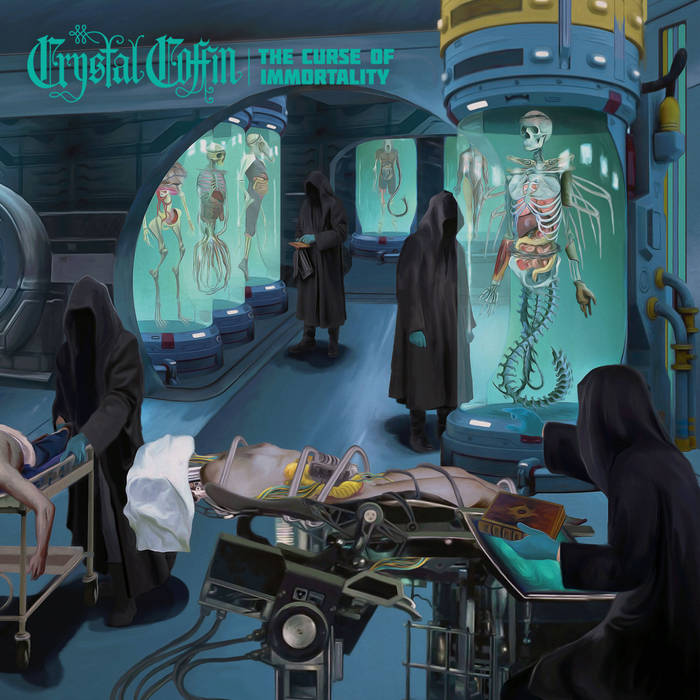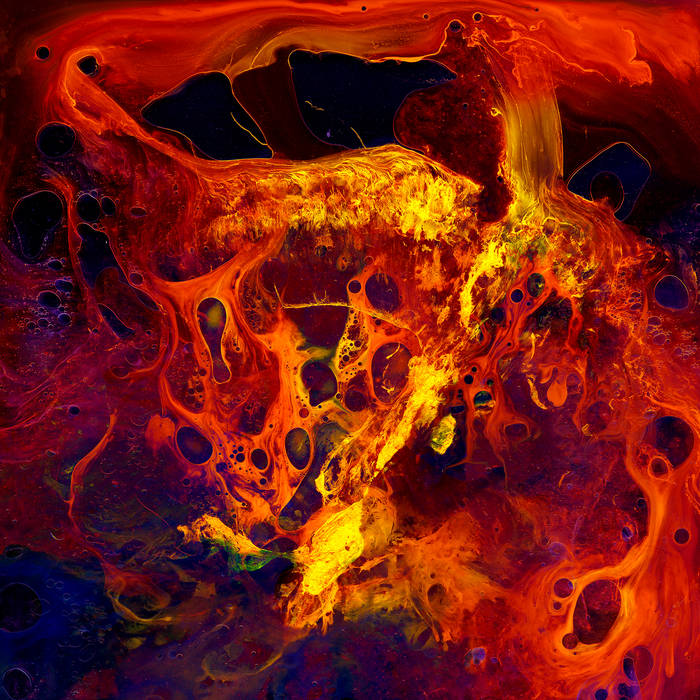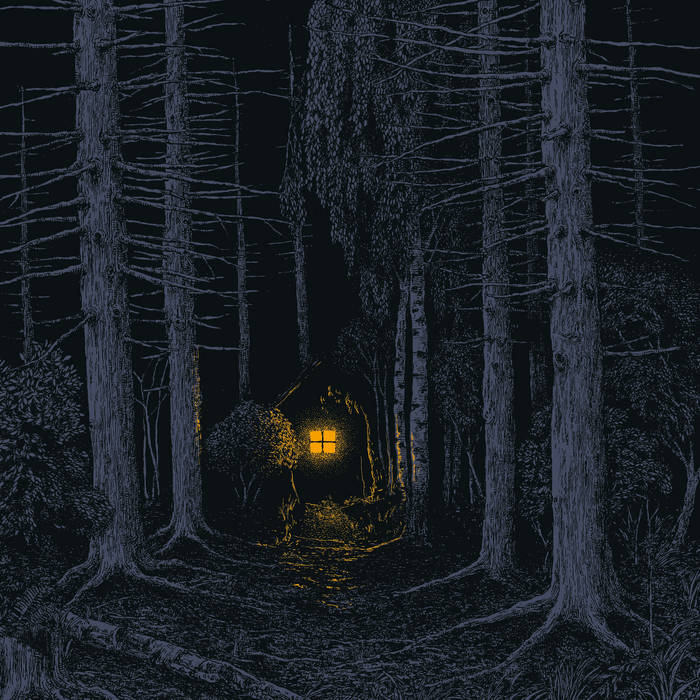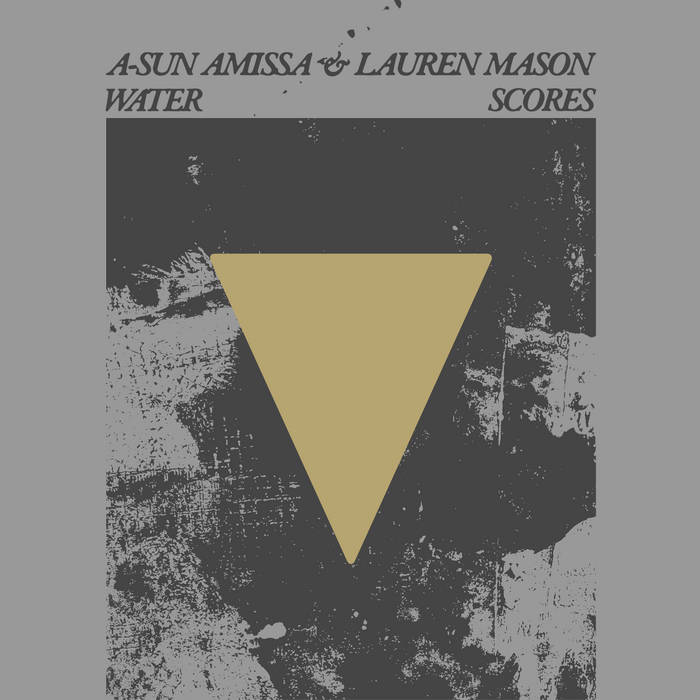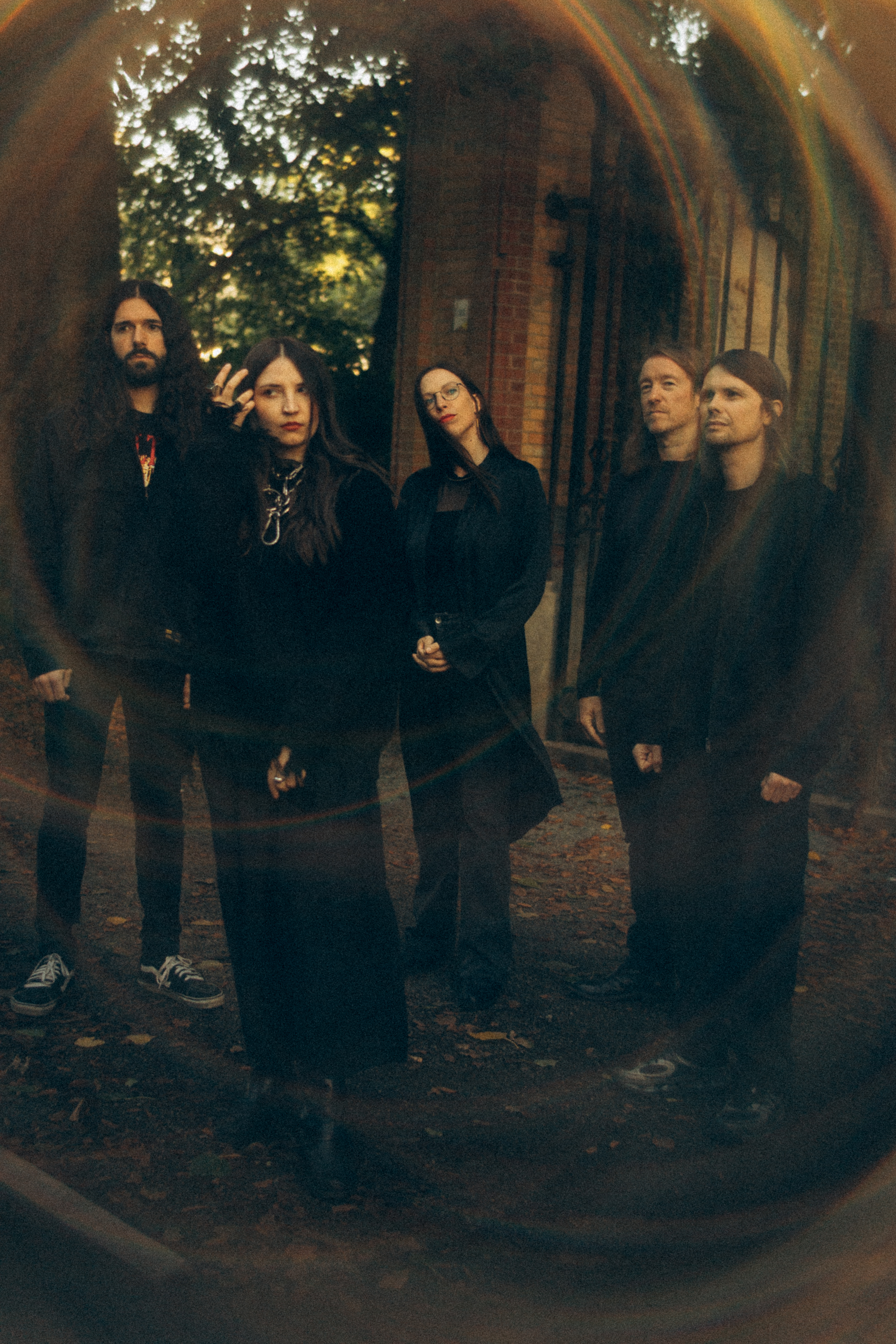Crystal Coffin is one of these bands that many of us can automatically fall in love with. A really good punch, some gnitty-gritty crunch and (maybe most important) something to say in the form of food for thought. A few months ago we told you about their latest record The Curse of Immortality and we are still so intrigued by the record that we arranged for an interview with Lenkyn about the record, the band’s history and much more, including the modern desire for immortality.
Some of you might have noticed it, we have been trying to come up with more information for you and what can be more informative than a well-versed interview? Hardly anything, right? Therefore we will try to give you another interview in written form every second Wednesday. We already had Marthe and Alex Anesiadis and now we want to give you our interview with Lenkyn from Crystal Coffin. Martin wrote a very very favorable, and justifiedly so, review of their third full-length The Curse of Immortality. We spoke with Lenkyn in detail about the curse that immortality brings, their special form of Blackened Melodic Death Metal, the importance of a good cover artwork and much, much more. Enjoy!
Lenkyn, first of all, thanks for taking your time to answer these questions. Where are we catching you right now?
I’m lying inside a crystal coffin, obviously.
Your record The Curse of Immortality has been out now for a few months – are you happy with the feedback you’ve received? Yes, definitely! With each of our releases, we find new audiences and, generally speaking, people seem refreshed by the sounds, production, and themes therein which is an incredibly rewarding experience. Without any label support, Crystal Coffin has always been a rather hidden band for many audiences to find so receiving emails and comments from fans/countries all of the world has been incredible. There’s been a consensus that The Curse of Immortality has been the strongest of our three releases so it’s great to know that others have seen/heard our progress and maturation over the past five years with each album not only becoming more involved but exhibiting different levels of complexity and musical arrangement. For listeners just discovering the band with this third album, it’s cool for them to be able to go back to discover the earlier two releases to help put all the themes into context.
Can you tell us a bit about the overarching theme of the songs, because you surely are not talking about immortal gods or vampires?! While writing each of our albums, we loosely settle on an over-arching theme, story, or event early on to help hinge our lyrics and imagery upon. With our first album, The Transformation Room (from 2020) we took scenes from the historical Holodomor in eastern Europe during the early 20th century and made connections between one’s own stuggle and pain to a higher plain of existence or sensation. Throughout The Starway Eternal (2021), the Chernobyl tragedy in the plant’s Sector 4 set a somewhat contemporary scene for interplanetary exploration and a means for us to present some of our nihilistic thoughts and philosophies through a protagonist who goes searching for the purported gods of our known solar system only to be burnt to blackened nothingness during her decsent back to earth. Now within The Curse of Immortality we have chosen more of a futurist/sci-fi stage to examine death through mortal memory and genreational storytelling as an ultimate symbol for immortality.
Notions of death is a pretty stereotypical subject matter in metal lyrics but we hope that through our writing style poetic imagery, struture, and cadence all fuse together to help support many of the emotions that live song-to-song. Aron has such a strong and intense sounding voice made for this brand of black metal while employing a real intuitive touch for linking passages together and delivering them in such a way that works well within each of the songs so that the listener can still actively listen to the words and unfold the album(s) at their own pace. At a basic level, we have written albums that present stories that are the sort that would interest us three as fans of music and horror. This has included compelling imagery, horrific dilemmas, sci-fi elements and sounds, and layered instrumentations that hopefully yield a few moments of beauty beneath much of the aggression. On both the second album, and now again on this third release, I’ve sung clean vocals to balance Aron’s rasp in small amounts and I think that for such a personal album as The Curse of Immortality has become it has made a lot of sense! For example, my father killed himself when I was 14 years old and reflecting on such an experience really helped ground the lyrical content over the course of this fantastical album - we are all singing/playing from personal experiences even though, on the surface, the lyrics might sound like something out of an episode of Star Trek at times. My vocals during “Final Breaths” is an opportunity to have one last exchange with my father that I was never granted years ago as a child. There’s something vaguely cathartic if you can imagine such an important family member taking one last moment before they die to express to you “go onward now and live your life, forget about me and what all I’ve done…” as a possible apology or rationale for such a chaotic moment forced into your world. I know that there are many similar parts over the course this album that speak to similar moments of intensity and pathos that the three of us have each lived through.
And with that in mind you can begin to understand the theme of “immortality” as we’ve presented it: Here we have a protagonist no longer wishing to be alive but through the nefarious machinations of government-cum-scientific forces beyond their control they are forced to remain alive. I view this plot point as a simple take on personal and collective memory and struggle. People we have lost always remain with us. We’ve just taken such a thought a few steps further and have fully adapted the roles of lost friends and family to be cybernetic beings that now help eliminate what was once called death/mortality on earth. One’s life might be net positive, but it’s not difficult to understand the horrors that would begin to plague them if all of a sudden they were never allowed to die.
What is most negative aspect of “immortality” for you? The breaking down of one’s body and health. How those closest to you may be burdened by a functional body but a mind that no longer can comprehend or remember basic facts. Boredom, sustained pain, regret, and the self-torture that can from remorse and hurting those around you who you cared about but who you harmed through your own various limitations or aggresion when not afforded a second chance. Time can heal most wounds but after enough harm it’s simply time to die. And that’s entirely fine, I think. We are a species of intelligent animals living during a time together that none of us picked. An absolute lottery that should be aknowledge and embraced for the beautiful randomness that it is.
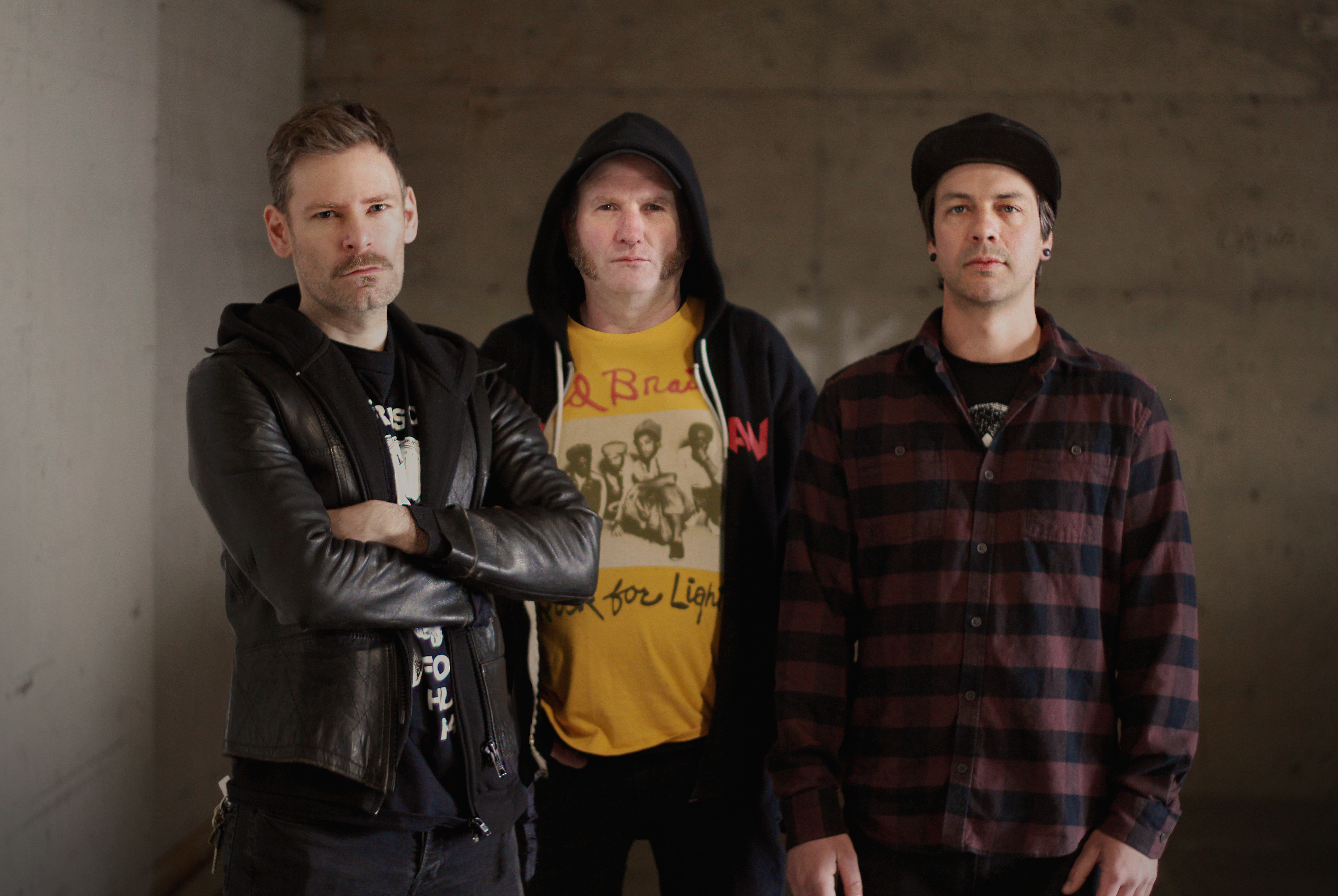
How far do you think should mankind go in its strife against certain diseases? Is it really that positive that we can easily become 70, 80 years of age? Striving to cure disease for the reduction of pain and suffering is entirely reasonable. There is enough emotional pain and struggle that we each need to navigate with our limited and unique (and oftentimes inferior) set of personal skills day-to-day that being inflicted with phyiscal ailments and limitations is entirely unfair. But this is an entirely unfair existence we’re forced into, so really all we can do with our time is be supportive of others and considerate of everyone’s differences/unique battles. Life in its current form is quite long. I sometimes ponder a lifespan of 50-60 years and wonder if there’s a better or a worse setting for humanity.
When listening to the record, one thing was pretty clear – you have a certain love for melodic parts and elements, right? Definitely! The three of us have always had a wide breadth of influences musically and that seems to be evident throughout in many of our songs.Since the vocals deliver more emotion than melody, the layers of instruments and their relationships more than make up for that and interlock with the delivery Aron has recorded.
Has it been your aim for Crystal Coffin to create music which has depth and melody? How clear cut are these ideas and notions for you when you write the songs?
Crystal Coffin music has been the result of the people involved, our unique and shared influences, and the collection of ideas that come out and compliment all aspects of practice and repetition. When you’ve got a basic idea or musical progression, it seems to me that over time a natural melody begins to come out as your ear starts hearing various options and adjustments. We have never sat down and said to ourselves, “okay, we need to write a melodic song here to balance out the other tracks we have.” It’s moreso just been the organic result of the three of us playing and writing parts that we would like to hear ourselves as music fans/listerners or expect to hear at various moments.
How do you go about writing the music? Is it a free-for-all or is there a clear-cut main songwriter?
Our first album The Transformation Room was written as a trio in our practice space over the course of 2 or 3 years. It was very slow, but mostly because we were really still figuring out our individual styles as players and how to gel them into something much larger (and what would become a full-length album). It wasn’t the easiest process honestly but there were some exciting moments captured within that recording. The first album released in March 2020 right as the pandemic was beginning to take hold and ruin any proper support that we were to give to it. We couldn’t play live and we couldn’t even practice in-person for a long time. After enough down time, I kinda got fed up at home and decided that I would use my time and efforts to write a bunch of new songs that would eventually become The Starway Eternal. I had written basically 70-80 percent of it by the time that we (in Canada) were able to meet up in-person again by late summer/early fall 2020, and then at that point Aron and Rob became more comfortable with the new tracks and helped to edit and re-arrange many of the parts (Aron has always had a good ear for msuical arrangement!). The second album was significantly more successful than the first, both from how the material was received by fans and from a process standpoint internally, so once it was released and we had played a few shows locally we seemed a bit more open to the more singular approach to song/album writing. I wrote the same 80 percent or so of The Curse of Immortality at home while providing digital demos that we would then work on as a group in-person during practice. We really pushed ourselves this time though to speed up the entire process as we had booked studio time by that point for this third album. It put a bit of a fire under us to continue with the quick pace but once everything was pressed and released I started hearing areas that I really wish could’ve been afforded a bit more time to be polished during practices… but I suppose all musicians hear things on their albums that they’d choose to change if they could go back in time. As far as lyrics go - as has been crucial in all of our releases - early in the songwriting proces it has helped us to have a vague “theme” or direction where we’re heading.We’re all fans of vintage horror films and other various niche interests and moments in history, so we would always have discussions about what sort of subject matter we’d like to explore. I don’t really know how, but having the sense that I’m going to write “songs that belong down in the basement of an evil sci-fi laboratory where the government has figured out the formula for immortality” helps during the creative process, haha! Once we’re jamming the songs at practice, Aron will say to me “okay, i want to start singing, I have some ideas for melodies/cadence…” and so the next step is for me to generate pages and pages of loose poetry or connected ideas. I eventually hand that off to him and via a very “William Burroughs-like” process he deconstructs the original words, and in his own, and then reconstructs everything to work in the song structures and passages while still holding/pointing to the larger theme that we initially set out towards. I think that overall that this general process worked extremely well.
Another thing that struck me positively, was a certain kind of street credibility, if I may say so. Even though you don’t seem to aim for it, but your band is riding the razor’s edge brilliantly – getting cheers from many parts, right?
If you mean that barely anyone knows that we exist then, yes, you’re correct. There’s a certain type of music fan that will give time to exploring unsigned bands. Many others maybe have an allegiance to certain labels to help filter their music/new releases or rely on reviews/word of mouth. Without label support, our reach has been comparively limited in that sense but still we have found fans view the handful of reviews our albums have garnered. Also, it’s worth mentioning that when you’re working entirely 100% to your own ideas with no else to consider you tend to end up with a really pure creative product that hasn’t been tampered or influenced by anyone outside of the band. The three of us have been extremely proud of what we’ve released because of this even if only a few hundred people know our music.
You also play with many different drum patterns and rhythms – were there certain influences on these aspects of your band? Rob’s approach has always been to write skeleton patterns by playing with whatever beats will work best with the BPM of the track so that certain moods of the piece are never sacrificed. Once he’s in the pocket with the song, adding in more complimentary and complex fills and transitions help to give the piece more texture. Some of his foremost influences have been Aaron Weaver from Wolves in the Throne Room, Jason Roeder from Neurosis and Anthony Paterra from Zombi!
What are the general influences musically and other than that? Within metal, we’re fans of bands like Enslaved, Wolves in the Throne Room, Full of Hell, High on Fire, Leviathan, Ulver, Electric Wizard, Yob and Death. Outside of the genre, prog and kraut rock have been longterm favourites, Can, Mahavishnu Orchestra, Gong, and stuff like that. We’re huge vintage horror/1970s Italian horror fans so not only do the sounds of Fabio Frizzi influence us but also so do many of the atmospheric and visual elements.
How important are the visual aspects of the band for you? Can you tell us a bit about the artwork of the record? About as important as it can get! I think a shared experience for most record collectors is the activity of viewing in detail the album jacket, artwork, lyrics, and liner notes while listening to a newly received album. That’s something that we each do in our own time and when we started releasing albums we definitely wanted to ensure that the presentation and packaging could be enjoyed by others in a similar fashion. Also, when you’re an unsigned band and have very little money to work with you look internally to make all ends meet. I have an aducation and background working in visual design/illustration and so it became readily apparent that I would work on all the illustrative and design elements for our releases. Some of our favourite covers have been by Droids (Star Peace), Van Der Graaf Generator, Yes/Roger Dean, and the works of Paul Romano so we knew that we wanted the images included across our covers to help support the lyrical content found therein. Obviously with The Curse of Immortality we’re presenting the listener with a very literal science lab with a great amount of experimentation going on, but hopefully it helps provide a visual environment for some of the other themes presented over the 8 tracks. There’s been a lot of feedback online about our covers online for each of the three albums, both positive and negative, but ultimately we’ve been really pleased with how their each turned out and are connected to the music!
If you could curate a one-day 5 or 6-bands-festival with Crystal Coffin also playing – what would the line-up be? It’d be pretty memorable for us to open a day with groups like Enslaved, Yob, Imperial Triumphant, Uada, Krallice and Gorgoroth.
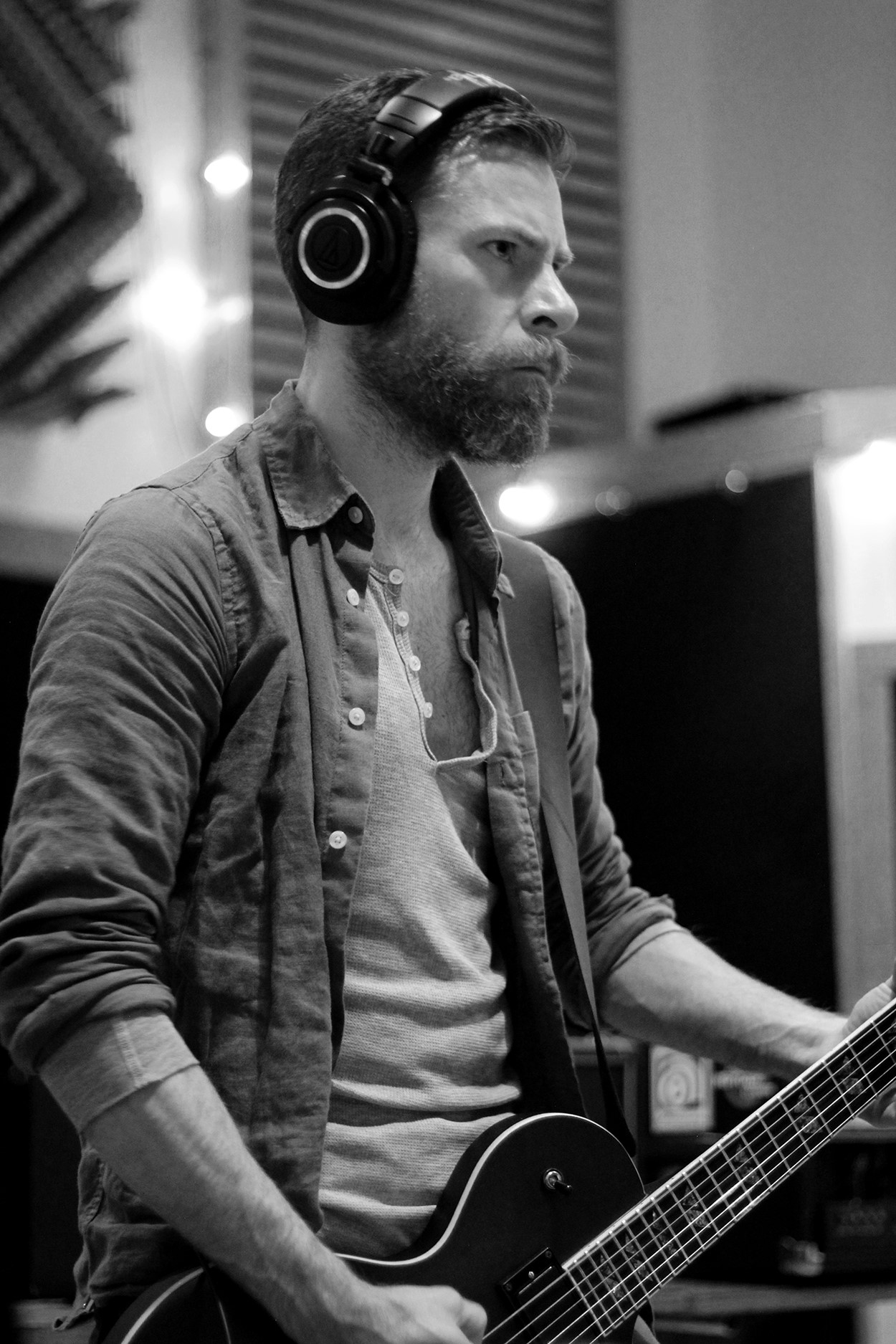
And now the infamous quickfire round.
AC/DC vs Van Halen? Van Halen
Writing & Recording vs Touring? Writing & Recording though I suspect Rob and Aron would answer Touring!
Graphic Novel or Cartoon? Ralph Bakshi
Football vs Hockey? Hockey
Death vs Morbid Angel? Death
Pyrrhon vs Krallice? Krallice
Local Headlining Tour for Crystal Coffin vs Coast-to-Coast Support Slot? Support slot

